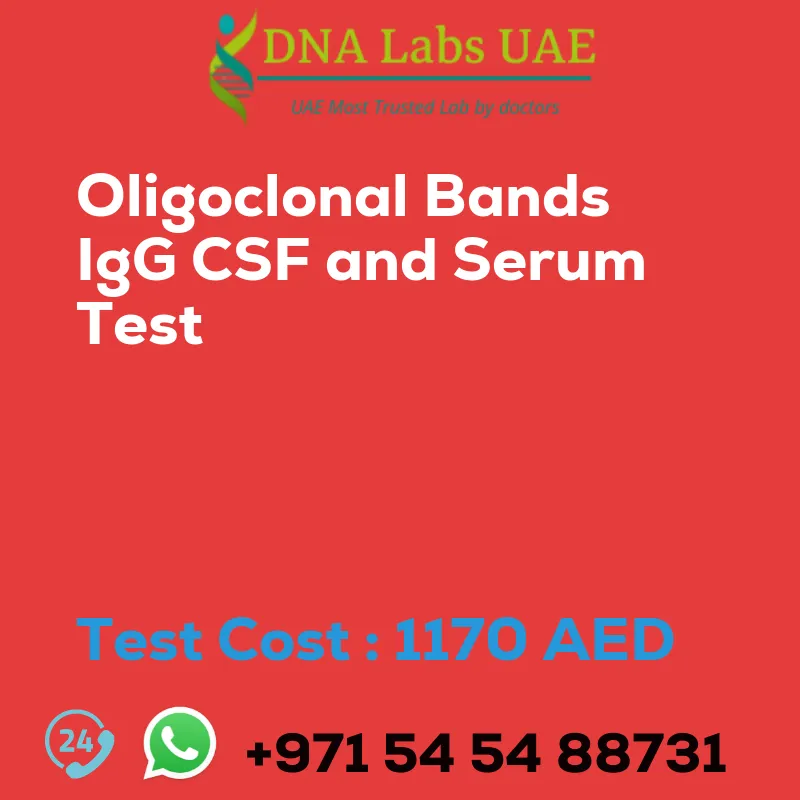OLIGOCLONAL BANDS IgG CSF and SERUM Test
At DNA Labs UAE, we offer the OLIGOCLONAL BANDS IgG CSF and SERUM Test to detect the presence of specific immunoglobulin G (IgG) bands in both cerebrospinal fluid (CSF) and serum samples. This test is commonly used in the diagnosis of multiple sclerosis (MS) and other inflammatory or autoimmune conditions affecting the central nervous system.
Test Details
The OLIGOCLONAL BANDS IgG CSF and SERUM Test involves comparing the patterns of IgG bands in the CSF and serum samples. Normally, the pattern of IgG bands in the CSF should be similar to or fewer than those in the serum. If there are additional or different bands in the CSF compared to the serum, it suggests an abnormal immune response within the central nervous system.
Symptoms and Diagnosis
OLIGOCLONAL BANDS IgG CSF and SERUM Test can help diagnose multiple sclerosis (MS) as OCBs are present in the majority of MS patients. However, OCBs can also be found in other conditions such as infections, autoimmune disorders, and certain cancers. It is important to note that the presence of OCBs alone is not sufficient to diagnose a specific condition. Further clinical evaluation and additional tests are usually necessary to determine the underlying cause of the OCBs and to confirm a diagnosis.
Test Cost
The OLIGOCLONAL BANDS IgG CSF and SERUM Test is available at a cost of AED 1170.0.
Sample Condition
For the test, we require 2 mL (1.5 mL min.) CSF in a sterile screw capped container and 2 mL (1.5 mL min.) serum from 1 SST. Serum should be separated within 1 hour of collection. Ideally, serum and CSF should be tested simultaneously. Please ship the samples refrigerated and do not freeze them.
Report Delivery
Sample should be delivered daily by 9 am, and the report will be available the next day.
Method
The OLIGOCLONAL BANDS IgG CSF and SERUM Test is performed using isoelectrofocusing, immunoturbidimetry, and nephelometry techniques.
Test Type
The OLIGOCLONAL BANDS IgG CSF and SERUM Test is primarily used for the diagnosis of multiple sclerosis (MS).
Referring Doctor
This test is typically ordered by a neurologist.
Test Department
The OLIGOCLONAL BANDS IgG CSF and SERUM Test is conducted in the ELECTROPHORESIS department at DNA Labs UAE.
Pre Test Information
Ideally, serum and CSF should be tested simultaneously for accurate results.
For more information about the OLIGOCLONAL BANDS IgG CSF and SERUM Test or to schedule an appointment, please contact DNA Labs UAE.
| Test Name | OLIGOCLONAL BANDS IgG CSF and SERUM Test |
|---|---|
| Components | *CSF & Serum Isoelectric focusing*CSF & Serum IgG |
| Price | 1170.0 AED |
| Sample Condition | 2 mL (1.5 mL min.) CSF in a sterile screw capped container AND2 mL (1.5 mL min.) serum from 1 SST. Serum should be separated within 1 hour of collection. Ideally serum & CSF should be tested simultaneously. Ship refrigerated. DO NOT FREEZE. |
| Report Delivery | Sample Daily by 9 am; Report Next day |
| Method | Isoelectrofocusing Immunoturbidimetry Nephelometry |
| Test type | Multiple Sclerosis |
| Doctor | Neurologist |
| Test Department: | ELECTROPHORESIS |
| Pre Test Information | Ideally serum & CSF should be tested simultaneously. |
| Test Details | Oligoclonal bands (OCBs) IgG CSF & Serum test is a laboratory test used to detect the presence of specific immunoglobulin G (IgG) bands in both cerebrospinal fluid (CSF) and serum samples. OCBs are abnormal bands of IgG antibodies that can indicate the presence of an inflammatory or autoimmune condition affecting the central nervous system. The test involves comparing the patterns of IgG bands in the CSF and serum samples. Normally, the pattern of IgG bands in the CSF should be similar to or fewer than those in the serum. If there are additional or different bands in the CSF compared to the serum, it suggests an abnormal immune response within the central nervous system. OCBs IgG CSF & Serum test is commonly used in the diagnosis of multiple sclerosis (MS), as OCBs are present in the majority of MS patients. However, OCBs can also be found in other conditions such as infections, autoimmune disorders, and certain cancers. The test is typically performed by separating the IgG proteins in the CSF and serum samples using a technique called electrophoresis. The separated proteins are then stained with specific dyes that bind to IgG, allowing the bands to be visualized. The pattern of bands is then analyzed and compared between the CSF and serum samples. It is important to note that the presence of OCBs alone is not sufficient to diagnose a specific condition. Further clinical evaluation and additional tests are usually necessary to determine the underlying cause of the OCBs and to confirm a diagnosis. |







